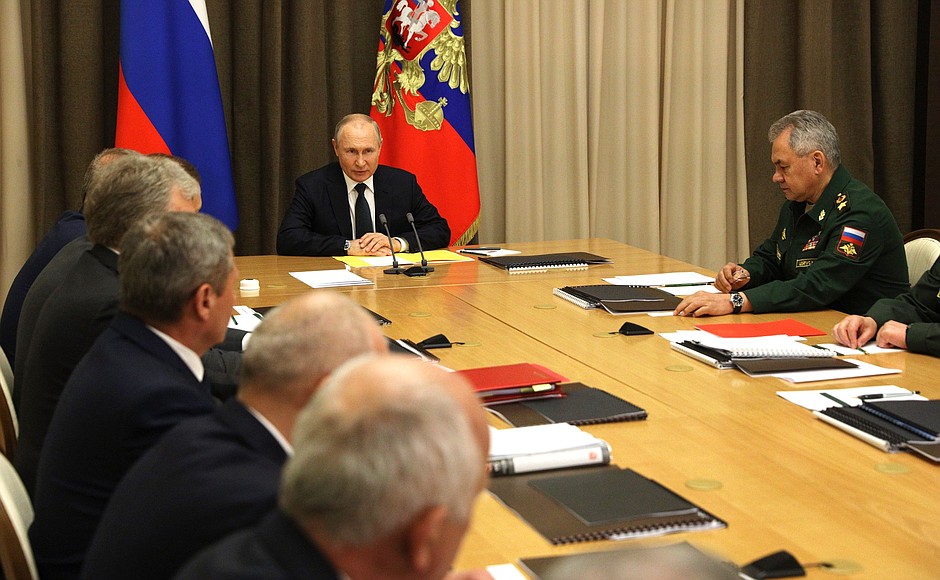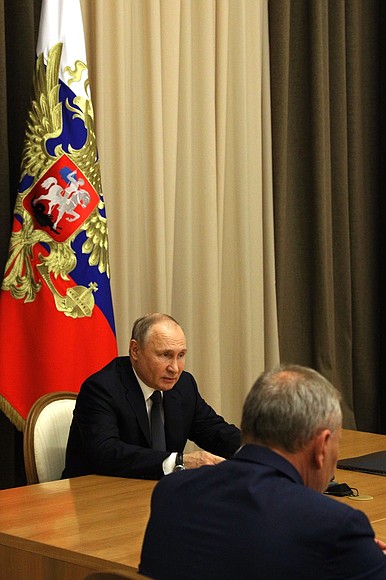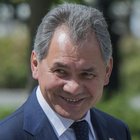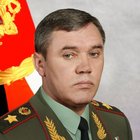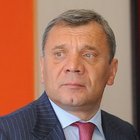Today’s meeting is devoted to the development and serial production of long-range precision weapons and other modern attack systems, and the development of military transport aviation for the Aerospace Forces.
Earlier, at meetings held all of this week the discussion covered the long-term development of the Armed Forces and the implementation of the state defence order.
The final meeting was attended by Defence Minister Sergei Shoigu, Head of the General Staff – First Deputy Defence Minister Valery Gerasimov, Deputy Defence Minister Alexei Krivoruchko, Commander-in-Chief of the Aerospace Forces Sergei Surovikin, Commander-in-Chief of the Navy Nikolai Yevmenov, First Deputy Chief of the Main Operational Directorate of the General Staff Viktor Poznikhir, Head of the 3rd Department of the Main Operational Directorate of the General Staff Andrei Sterlin. Other officials invited to the meeting included Deputy Prime Minister Yury Borisov, top officials from the Ministry of Industry and Trade, the Accounts Chamber, the Military-Industrial Commission, the Federal Service for Technical and Export Control, and the state corporations Roscosmos, Rostec, as well as the United Aircraft Corporation.
* * *
President of Russia Vladimir Putin: Good afternoon, colleagues.
Today, we are concluding the current round of meetings on strengthening our Army, Navy and defence industry.
The first item on our agenda will be prospects for the development and production of long-range precision weapons and other modern attack systems.
See also
An analysis of armed conflicts of the past few decades and the experience of the development of the world’s leading armies show the growing role of the effective use of, say, cruise missiles with different platform bases, as well as guided munitions. It is important to provide our Army and Navy with an adequate number of precision weapons of this kind.
Now our troops have received or are receiving the latest Х-101 and Calibre long-range cruise missiles, ballistic and cruise missiles of the Iskander tactical systems, multiple launch rocket systems and guided air bombs of different calibers.
In terms of specifications, they are not inferior to their foreign counterparts. Moreover, they are often superior to them and unique in some specifications. This has been confirmed in combat as well – during the anti-terrorist operations in Syria.
It is important to maintain the necessary production rate of contemporary strike weapons for their use and combat training.
Colleagues, I would like to hear from you what organisational and economic decisions would allow for dealing with this task in the most efficient way and also about the preparedness of defence industry enterprises for the serial production of the most advanced weapons.
The second issue is the development of the military transport aviation of the Aerospace Forces. I want to note that its consolidated operation and the fleet’s readiness defines its capability to move troops promptly over great distances. For our country, the largest country in the world, it is especially important that our army can be compact but efficient. It is also important for holding successful landing operations.
It is obvious that our Armed Forces need to have enough military and transport aircraft and heavy helicopters. There are certain achievements and groundwork in this area.
Thus, the technical serviceability of An-124 strategic airlifts is being maintained with the use of Russian-made components. The state trials of the Il-112V light military transport aircraft are being concluded; in 2021, plans call for delivering two such planes. The production of Il-76 is being resumed on a new technological base. The army will receive five Il-76MD-90As before the end of the year.
At the same time, according to preliminary data, the Defence Ministry requires many more military transport aircraft and helicopters.
Let us discuss today how to solve this problem, outline measures to boost production and modernise the military transport industry.
Let us get down to business.
<…>
